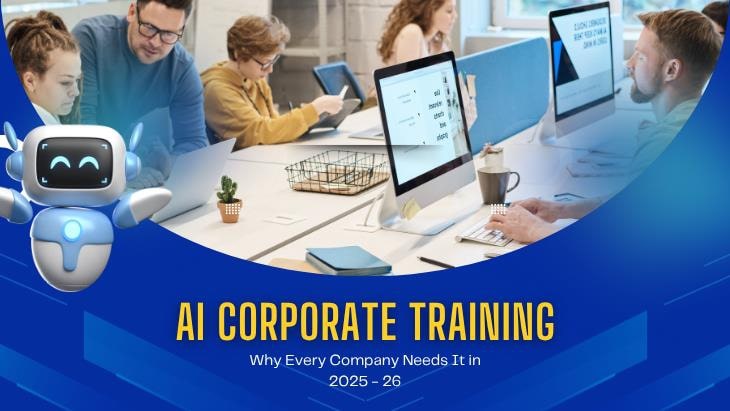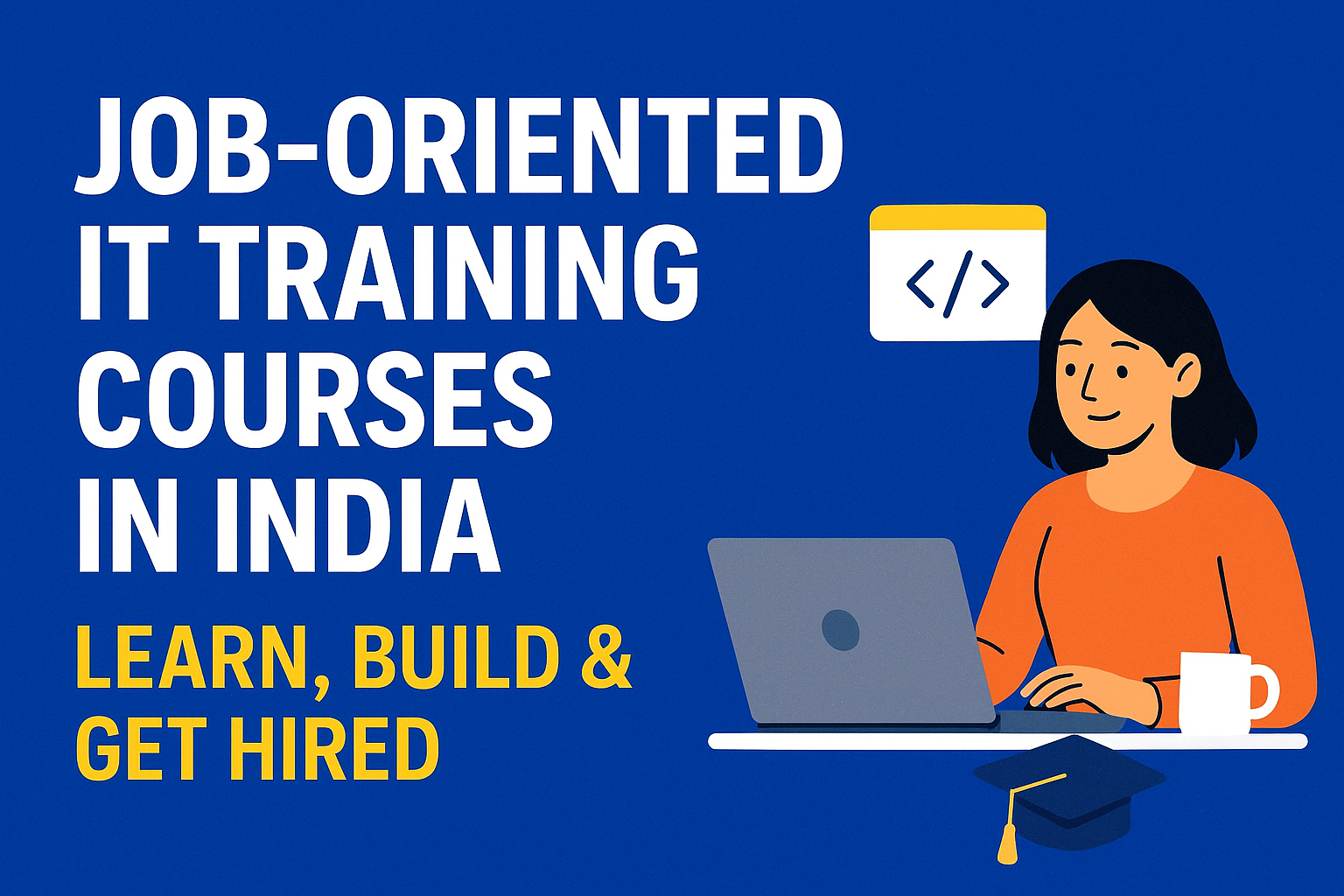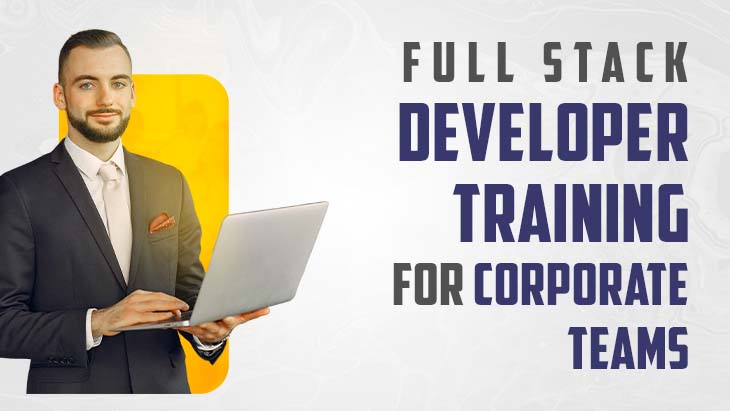"Tech Courses That Are Perfect for Corporate Professionals" is a list of beginner-friendly technology programs that are specifically made for people who work in non-tech corporate roles like HR, finance, sales, administration, operations, or marketing and want to switch careers to the IT or tech industry.
These tech courses are great for people who work in these fields:
Want to get into tech without having coded before
Want to learn in a way that works for you (on weekends, part-time, or at your own pace)
Want to learn useful skills that will help you get a good job in the future
Need to learn new skills quickly, usually in three to six months
You've worked in the corporate world for years, going to meetings, meeting deadlines, balancing spreadsheets, and moving up the ladder. You've learned new things, dealt with stress, and made a difference. But you might feel like something is missing deep down. It could be the routine, the lack of progress, or the fact that you know your current path has a limit.
You're not the only one.
Thousands of professionals all over the world are stopping what they're doing and asking, "Is this really it?" For a lot of people, the answer is to make a bold, exciting change and get into technology.
And here's the good news: You don't need to quit your job, have years of programming experience, or get a degree in computer science to get into tech. You only need the right attitude, a clear path, and the right course. This guide will show you exactly what that path might look like.
Why Are These Courses Important?
A lot of corporate professionals feel stuck in jobs that are the same all the time or in industries that are being disrupted by automation. These tech classes help them connect what they already know (like how to manage projects, solve problems, and communicate) with what they need to do well in the new digital economy (like how to analyze data, use the cloud, or market online).
Full Stack Web Development – Learn how to make websites and apps from scratch
Data Analytics: Get useful business information from raw data
Digital marketing includes SEO, Google Ads, and tracking performance.
UI/UX Design—Make interfaces that are easy to use (no coding needed)
Cloud Computing: Use AWS, Azure, or GCP platforms to do your work.
Cybersecurity Basics: Keep digital networks and systems safe
RPA (Robotic Process Automation) makes work easier by automating tasks and cutting down on manual work.
Why People Are Moving to Tech Career
The business world is changing quickly, and not always in ways that are good for you. Automation is making traditional roles smaller.
Software and AI tools are taking over administrative tasks, repetitive tasks, and even making decisions at the middle level. Roles that used to feel safe are now being changed or taken away.
But here's the chance: You already have an advantage.
You've worked on important skills like communication, teamwork, problem-solving, time management, and leadership, which is different from new graduates. These are the kinds of soft skills that tech teams value but don't always have.
Why Tech Makes Sense Now More Than Ever:
You can move up in your career faster than in other fields.
More money, even for entry-level jobs
Opportunities around the world and the freedom to work from anywhere
Always learning, improving your skills, and staying relevant in the job market
A recent LinkedIn study found that 42% of people who changed jobs in 2024 went into tech or tech-related jobs. That number is going up even faster in 2025.
What Makes a Course Perfect for People Who Work in Business?
You don't have all the time in the world like a college student. You need to learn in a smart and efficient way that fits with your life and career goals. What to look for:
-
✅ Options with no code or low code: You don't need to know how to code to work in tech. You can fix problems with a lot of tools and roles without knowing a lot about coding.
-
✅ Content that is easy for beginners and focused on jobs Courses should not require any prior tech knowledge and should teach skills that employers value right now.
-
✅ Schedules for learning that are flexible: You can learn around your job by taking evening or weekend classes, self-paced modules, or watching recorded content.
-
✅ Ready for work in 3 to 6 months: Pick classes that will help you get real results in less than a year. These classes should have hands-on projects, case studies, and real tools.
-
✅ Certifications that are important: Don't bother with shiny certificates. Focus on the results: Will this course help me get a job, a promotion, or be ready to work as a freelancer? Tip: Certifications don't guarantee a job, but a good project portfolio does. Learn, make, and show what you can do.
The Best Tech Courses for People Who Want to Change Careers
Let's look at 10 of the best tech courses for professionals like you, no matter if you're creative, analytical, strategic, or hands-on.
1. Full Stack Web Development
Best for: people who think logically, build things, and solve problems
You will learn: HTML, CSS, JavaScript, React, Node.js, and MongoDB.
Jobs: Web developer, frontend developer, and full stack engineer are some of the jobs you can get.
Why it works: You'll learn how to make full websites and apps, which are skills that are in high demand at startups, agencies, and product companies.
2. Data Analysis
Best for: people who work in finance, sales, or Excel
You'll learn how to use Python, SQL, Excel automation, Power BI, and Tableau.
Jobs: Reporting Specialist, BI Analyst, Data Analyst
Why it works: In today's business world, data is the language. This is your chance to turn your love of working with numbers into a powerful, tech-enabled career if you already do.
3. Digital Marketing and Marketing Automation
Best for: marketers, salespeople, and people who make content
You will learn about Google Ads, SEO, GA4, email automation, and social media tools.
Jobs: Digital marketer, performance marketer, and SEO/SEM specialist are all jobs you can do.
Why it works: Use both creativity and strategy to get real results in your business. It's also a good path for freelancers.
4. Cloud Computing (AWS, Azure, GCP)
Best for: people who work in administration, operations, or tech support
You will learn about cloud services, the basics of DevOps, and deployment workflows.
Jobs: Cloud Engineer, DevOps Associate, Cloud Admin
Why it works: All businesses are going to the cloud. Getting certified by AWS, Azure, or Google can greatly increase your worth.
5. Data Science and Machine Learning
Best for: people who work with math, strategists, and business analysts
You'll learn about AI models, data pipelines, Python for ML, and Pandas and NumPy.
Jobs: AI Analyst, ML Engineer, and Data Scientist
Why it works: If you like making predictions, finding patterns, and making sense of complicated data, this is one of the best careers for the future.
6. Basic Cybersecurity
Best for: people who work in compliance, auditing, administration, or law
You will learn how to protect your network, model threats, and hack ethically.
Jobs: GRC Associate, Security Analyst, SOC Help
How it works: For all businesses, security is a very important issue. A lot of entry-level jobs don't need a lot of tech skills, but they pay well and let you move up quickly.
7. UI/UX Design
Best for: marketers, designers, and content creators
You'll learn about wireframes, prototyping, user research, and Figma and Adobe XD.
Jobs: UI designer, UX researcher, product designer
Why it works: Design meets empathy and technology. This no-code career path might be perfect for you if you're creative and care about the user.
8. RPA (Robotic Process Automation)
Best for people who work in HR, finance, administration, or operations
You'll learn: Power Automate, Automation Anywhere, and UiPath
Jobs: Automation Analyst, RPA Developer
How it works: You don't need to know how to code to automate business processes you already know how to do.
9. DevOps
Best for: IT support, system administrators, and operations staff who are interested in technology
You'll learn the basics of CI/CD pipelines, Docker, Jenkins, and Kubernetes.
Jobs: Release Engineer, DevOps Engineer
Why it works: DevOps is all about making development and deployment easier, which is great for people who like to think about processes.
10. Making Apps for Mobile Devices
Best for: People who love technology, work for themselves, or are interested in products
You will learn about Flutter, React Native, APIs, and mobile UI/UX.
Jobs: Mobile Developer, App Developer (for iOS and Android)
What makes it work: The default is now mobile-first. You can either build your own app or work for a company. Either way, it's a big deal.
Bonus Tip: Begin with one class. Learn it. Then dig deeper. Tech isn't a sprint; it's a marathon.
How to Choose the Right Course for You Based on Your Background
Here's a quick way to check in with yourself:
|
Your Strength |
Best Course Option |
|
Analytical/Logical |
Data Science, Cloud, Cybersecurity |
|
Creative/Visual |
UI/UX Design, Digital Marketing |
|
Managerial/Process-Oriented |
DevOps, RPA, Cloud |
|
Strategic/Numbers Driven |
Data Analytics, Digital Marketing |
|
Fast ROI/Flexible Work |
Digital Marketing, Web Design |
Before you sign up for a full program, try a free intro module or mini-course to see if you like it.
The Future of Tech Jobs for People Who Want to Change Careers
It's not just coders who use tech anymore. It includes people from many fields and is growing quickly. As AI, automation, and cloud computing get better, there is a huge need for people who know a lot about a field and also know how to use technology.
Your corporate experience gives you a strategic edge, even if you start at the bottom. You’re not just learning tech—you’re applying it with real-world context.
Pro Tips for Corporate Learners
Start small: One hour a day adds up to 30 hours a month.
Stay on one path: Don't get distracted by shiny things.
Get involved in communities like Discord, Reddit, GitHub, and LinkedIn groups.
Make a portfolio: Projects are better than certificates.
Keep track of your trip: Post on LinkedIn and blog about it. It makes you look more credible.
Conclusion
Changing careers can be scary, but the truth is that you already have some experience. You already have important skills in leadership, communication, and problem-solving that the tech world needs right now. You need the right tools and guidance right now to switch to a more rewarding career that will last.
There is a tech course for you, no matter if you like data, design, development, or digital marketing. These aren't just classes; they're the start of your next big adventure. You can start your transition to tech today without quitting your job or starting over. The courses are flexible, easy to understand, and focused on getting you a job.
Still not sure where to start? Don’t worry—TechaEDU is here to guide you.
Talk to a career counselor right away to get course suggestions that are tailored to your skills, interests, and career goals.





Leave a reply